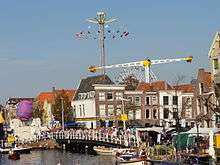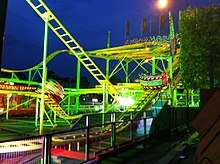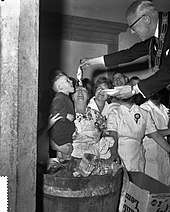3 October Festival
The 3 October Festival (Dutch : 3 Oktoberfeest or simply 3 Oktober, also Leidens Ontzet) is a festival in Leiden, the Netherlands. It is held annually during the days leading up to the 3rd and often concludes that evening or the following day.[1] It has been a local tradition since 1886.[2]
| 3 October Festival 3 Oktober | |
|---|---|
 The 2011 edition of the festival. | |
| Genre | Festival |
| Begins | Various dates |
| Ends | 3 or 4 October |
| Frequency | Annually |
| Location(s) | Leiden, Netherlands |
| Inaugurated | 1886 |
| Website | http://www.3october.nl |
Historical Origins
The festival commemorates the anniversary of the 1573 - 1574 Siege of Leiden during the Eighty Years' War when the Spanish Army attempted to capture the city.[3] The first siege lasted from October of 1573 until March of 1574, and the Spanish returned that May for a second attempt. The city had neglected, in the interim, to destroy Spanish fortifications outside of the city's protective walls and failed to acquire enough additional provisions to sustain a renewed siege, even though they were warned in advance of the Spanish forces' impending return.
With food supplies dwindling, Leiden's citizens were in despair as the Spanish attempted to infiltrate the city. Within two months, provisions within Leiden were almost completely exhausted. Desperate to improve morale, then mayor Pieter Adriaanszoon van der Werff went so far as to propose committing suicide so his constituents could eat his own body. That September, the army of Dutch rebel leader William the Silent began formulating a plan to liberate the city.
They began destroying dikes near Rotterdam in order to flood the surrounding countryside. However, it took several days before there was enough wind to direct the water over the land toward Leiden. A fierce storm aided their efforts on the night of October 2nd. The rising tide caused a portion of Leiden's city walls to begin crumbling. That, coupled by the rising water level in their camps, convinced the Spanish troops that an attack was underway and they fled in terror. By that time, hundreds of people within the city had perished due to starvation. According to legend, a boy, usually named as Cornelis Joppenszoon, left the city that night to explore the Spanish troop's now destroyed camps. He found a pot of stew made of carrots, onions, parsnips, and meat, supposedly still warm and undamaged by the water. He then returned to the city and informed everyone that the troops had fled.
William and his soldiers sailed to Leiden as part of a makeshift military fleet dubbed the Watergeuzen ("Sea Beggars") on the morning of October 3rd. They headed north along the Vliet canal, which now had water deep enough to support their boats, and brought food and other supplies to Leiden's starving citizens. The food supplies primarily consisted of herring and white bread (haring en wittebrood).[4] To reward the city's steadfast citizens for withstanding the Spanish attack, William established Leiden University the following year.[5]
Events

In honor of the liberation of Leiden on October 3rd, 1574, the day itself was declared an official city holiday in 1886. It is now celebrated with a variety of activities and events that take place in the days leading up to October 3rd.[6]
Many of the city's residents take October 3rd itself off from work or school to either participate in or enjoy the festivities. Typical traditions include: an evening parade on the night of October 2nd, a carnival and market in the center of the city, various theatrical performances and historical reenactments, and a memorial service in St. Peter's Church (Pieterskerk) that commemorates the traumatic events of the siege. A second parade takes place on the afternoon of October 3rd with a firework display later that evening.[1]

The traditional meal associated with the festival is herring and white bread (haring en wittebrood).[7][8] Cleaned herring along with a small loaf of white bread are handed out to city residents for free at the Weigh House (De Waag) at dawn on the morning of October 3rd, but prior registration and tickets are required.[9] On the evening of October 2nd, hutspot (a dish representative of the stew found in the Spanish troops' camp) is served at an event located on the Hooglandsekerkgracht, a street in the center of the city.[10]
Leiden-based band Rubberen Robbie's song "Drie Oktober" also commemorates the festival, and its lyrics refer to herring, hutspot, drinking, and partying.[11] In June of 2019, the festival was officially added to the Netherlands' National Heritage List.[12]
Controversies
In recent years, 3 October has drawn criticism from local residents and business owners, many of whom opt to leave the city during the festival. Their concerns involve: lax policing, public intoxication, fights, vandalism, litter, public vomiting and urination, noise levels from outdoor stages, and the high prices for attractions at the annual carnival.[13] Several businesses and hotels close altogether during the festival or discourage tourists from visiting the city while it's underway.[14]
Bar and cafe owners have also protested the high fees associated with hosting food carts, outdoor beer taps, and restrooms while expressing concerns over attendees who bring their own alcohol with them from home.[15]
References
- "3 October memorial service". Pieterskerk Leiden. Archived from the original on 1 October 2013. Retrieved 1 October 2013.
- "Cadeau voor 3 October Vereeniging" (in Dutch). Gemeente Leiden. 17 May 2011. Retrieved 1 October 2013.
- Film & Television Coll Europe. Routledge. 2012. p. 315. ISBN 9781135102951.
- Bruggeman, Robin (3 October 2012). "Haring, wittebrood en hutspot bij het Leids ontzet" (in Dutch). IS Geschiedenis. Retrieved 1 October 2013.
- "3 October: Leiden's Relief". Expatcentre Leiden. 2 October 2010. Archived from the original on 4 October 2013. Retrieved 1 October 2013.
- "Korte 3 oktober feitjes: Met uitjes..." (in Dutch). Dichbij. 28 September 2013. Retrieved 1 October 2013.
- McDonald, George (2011). Frommer's Amsterdam. John Wiley & Sons. p. 33. ISBN 9780470979518.
- Harmans, Gerard (2011). DK Eyewitness Travel Guide: The Netherlands. Dorling Kindersley. pp. 34–35. ISBN 9781405360746.
- "Leidens Ontzet". Holland (official tourist site). Retrieved 1 October 2013.
- de Lange, Jaap (16 September 2013). "Hutspottocht voor kanovaarders" (in Dutch). Dichtbij. Archived from the original on 4 October 2013. Retrieved 1 October 2013.
- "Leidse Liedjes en Muziek" (in Dutch). Leiden Info. Retrieved 5 October 2013.
- "3 oktober eindelijk op nationale erfgoedlijst" (in Dutch). Leidse Dagblad. Retrieved 28 June 2019.
- "Halfuurtje langer feest op 3 oktober? Acht buurtverenigingen vinden van niet: 'grens is bereikt'" (in Dutch). Leidsch Dagblad. Retrieved 22 October 2019.
- "Hotels Leiden ontraden toeristen te komen met 3 oktober" (in Dutch). Leidsch Dagblad. Retrieved 2 July 2019.
- "Free Oktober op laag pitje" (in Dutch). Leidsch Dagblad. Retrieved 2 July 2019.